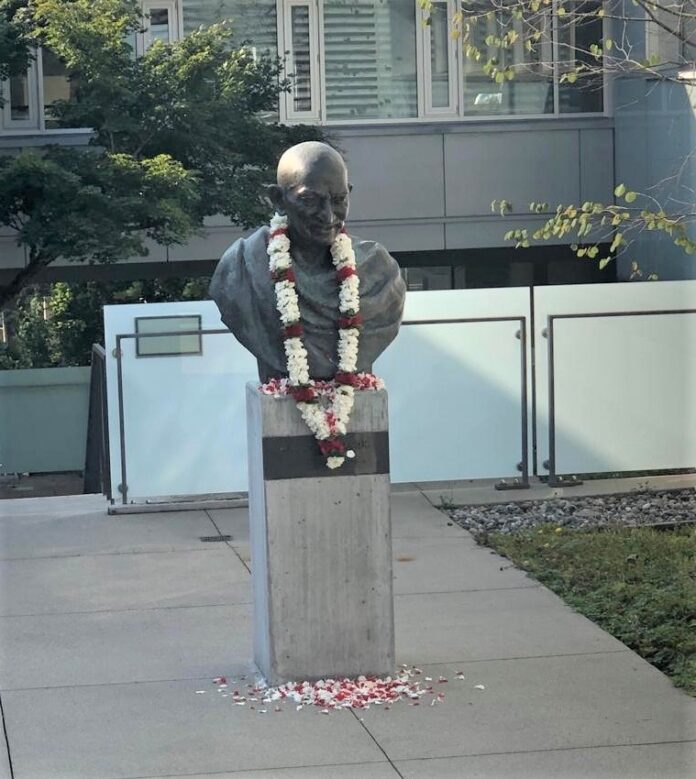THE Indian Consulate General in Vancouver reacted strongly at reports on Monday of the vandalization of Mahatma Gandhi’s memorial bust at SFU’s Burnaby campus. The head on the bust has been removed.
The Consulate General tweeted: “We strongly condemn heinous crime of vandalizing the statute of harbinger of peace Mahatma Gandhiji, @SFU Burnaby campus. The Canadian authorities are urged to investigate the matter urgently and bring the perpetrators to justice swiftly.”
SFU’s Institute for the Humanities noted on its website: “Mahatma Gandhi and his legacy have been honoured at Simon Fraser University since the unveiling of his memorial bust in the Simon Fraser Peace Square in l970. Each year the Gandhi Jayanti celebration brings members of the local Indo-Canadian community together with others who wish to salute his memory and honour his ideals.”
The Thakore Visiting Scholar Award that is sponsored jointly by the India Club of Vancouver, the Thakore Charitable Foundation, the Institute for the Humanities and the J.S. Woodsworth Chair in the Humanities at Simon Fraser University is also presented each year on the occasion.
Gandhi’s racist views when he was a young man have resulted in some demanding that his memorial bust be removed.
But the Gandhi Jayanti website (https://gandhijayanti.com/) said in an “Acknowledgement”: “On the celebration of Mahatma Gandhi’s birthday in 2020, we took a moment to reflect on what this event means to us given recent world events, particularly with respect to the ongoing violence and injustice being faced by the Black, Indigenous, and other people of colour (BIPOC) members of our community and around the world.”
It added: “At its heart, Gandhi Jayanti is a celebration of the principles of truth, non-violence, equality, self-sufficiency and sustainability. It is also a time for self-reflection and action where those involved find ways to carry forward and incorporate these principles into their lives.
“To embody these principles also means being upfront and honest about unpacking the complexities of Gandhi’s life. Much has been said about Gandhi’s early views on Black South Africans and his writings during his time in South Africa. In his 20s and at a time when he was practicing as a lawyer in South Africa, Gandhi held racist views towards Black South Africans. Later in his life, he came to realize that the struggle for equality and freedom that he sought for India was a fight for justice that included all marginalized peoples, and he became vehemently anti-racist.
“We disagree with Gandhi’s early views on race and they do not align with the values of this event.”
The website said that it acknowledges:
* Gandhi’s early racist attitudes towards Black South Africans run counter to humanity’s pursuit of justice and equality for all.
* His ability to recognize his bias and educate himself about the social injustice he was perpetuating, and the eventual positive evolution of his views on this important issue are things we will learn from.
It added: “In the spirit of learning and evolving our views, we commit to continually re-evaluate and adjust this event as we learn more about how we can best embody the principles of truth, non-violence, equality, self-sufficiency, and sustainability in today’s world.”











